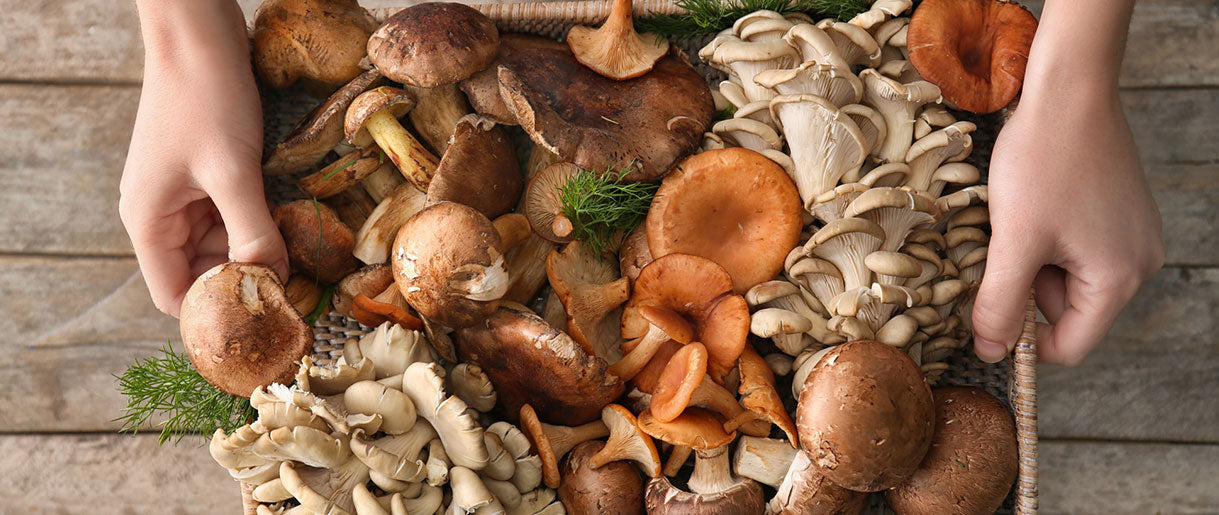In your journey to embrace natural alternatives for enhancing health and wellness, venturing into the fascinating world of mushrooms can be a transformative experience, especially when grappling with autoimmune diseases.
Harness the power of Reishi (Ganoderma lucidum), a mushroom celebrated for its immune-boosting and anti-inflammatory properties.
Explore the benefits of Cordyceps (Cordyceps sinensis), which is revered for enhancing immune function and reducing inflammation. Don't overlook the Turkey Tail (Trametes versicolor) mushroom, known for supporting gut health and bolstering the immune system.
Incorporate Shiitake (Lentinula edodes) in your diet, a mushroom that is nutrient-rich and supports cardiovascular health. Last but certainly not least, experience the wonders of Maitake (Grifola frondosa), a mushroom prized for stimulating the immune response and its anti-cancer properties.
We invite you to keep reading and journey with us as we delve deeper into the nurturing world of mushrooms. Uncover secrets, recipes, and firsthand experiences that could be your gateway to a rejuvenated life—step into a world where nature meets science, creating a harmony that nurtures and heals.
The Magical World of Mushrooms

A Historical Insight
Mushrooms have captivated human interest for thousands of years, not only as culinary delights but also for their medicinal properties.
From ancient civilizations to modern gourmet kitchens, edible mushrooms have carved out a special place in our diet and culture.
In traditional Chinese medicine, the role of mushrooms goes back centuries, revered for their healing properties and ability to enhance immune responses.
Cultural Significance
These fungi have not just been culinary staples; they've woven themselves into the tapestry of history, ascribed with various cultural and spiritual significances.
Their versatility has seen them embraced in various forms—as dietary supplements, delicacies, and even as symbols of enlightenment in several cultures.
The Rise in the Wellness Sphere
Today, we are witnessing a resurgence in the popularity of mushrooms, especially in the wellness and self-development spheres. More and more individuals are turning to edible and medicinal mushrooms to tap into their myriad health benefits.
As we delve deeper into understanding these fascinating organisms, medicinal mushroom science reveals their importance in fostering wellness.
Modern Integration and Science
The rise of medicinal mushrooms is fueled by an increasing body of research highlighting the potent bioactive compounds in these fungi.
These compounds are the secret behind the mushrooms' touted health benefits, acting as natural enhancers of our body's immune responses.
As a result, people are eager to consume medicinal mushrooms, integrating them into their diets as supplements or as part of gourmet dishes.
Understanding Autoimmune Disease

An Introduction to Autoimmune Disease
At the core of an autoimmune disease is an overactive immune system that mistakenly begins to attack healthy cells in the body.
This phenomenon is an error in the immune system, where immune cells, including T cells and natural killer cells, fail to distinguish between foreign invaders and the body's tissues.
This confusion leads to chronic inflammation, exacerbating autoimmune disease symptoms and often leading to rheumatoid arthritis and other autoimmune diseases.
Key Facts and Statistics
Understanding the gravity of autoimmune diseases necessitates a look at the statistics and facts. Globally, these diseases are on a steady rise, affecting a significant portion of the population.
Here, the immune system's role, encompassing a network of immune cells like white blood cells, is crucial in determining how these diseases manifest and progress.
The Day-to-Day Impact
Living with an autoimmune disease significantly impacts daily life, emphasizing the necessity of managing it well to maintain a semblance of normalcy. It's a constant battle where maintaining immune health becomes a priority.
Harnessing the innate immune system and fostering a healthy immune system can help keep the symptoms at bay. Achieving a healthy balance in immune function can potentially mitigate the adverse effects of the disease, promoting a better quality of life.
The Path to Management
Management starts with understanding the workings of autoimmune disorders, the intricate play between T cells, natural killer cells, and various other immune system components. Integrating strategies that nurture a healthy immune system and promote a healthy balance in the body is critical.
It involves a proactive approach to fostering immune health to minimize the tendency of the immune system to attack healthy cells, thereby creating a harmony that supports well-being amidst the challenges posed by autoimmune disorders.
Mushrooms and Immunity: The Science Explained

Emerging Research and Studies
In the evolving field of immunology, recent studies(1) constantly unveil the profound effects of mushrooms on the immune system. Researchers(2) are fervently exploring different species of mushrooms to unearth their potential as biological response modifiers.
These discoveries(3) paint a promising picture of medicinal fungus's future potential in bolstering individuals' immune systems, especially those grappling with autoimmune diseases.
Through their rich content of beta-glucans and other bioactive substances, these medicinal mushrooms are emerging as potential allies in fostering a healthy immune system.
Potential Benefits for Autoimmune Diseases
As we venture deeper into this realm, it becomes evident that the best mushrooms for autoimmune disease might be the key to unlocking many health benefits.
These edible mushrooms house a complex network of nutrients that synergistically promote a balanced immune response, essential for those battling autoimmune diseases.
These nutrients engage with various components of the immune system, enhancing the function of immune cells, including B cells, T cells, and white blood cells.
This engagement, in turn, helps stabilize the immune systems, encouraging a harmony that could alleviate symptoms commonly associated with these diseases, such as chronic fatigue.
Moreover, the rich presence of beta-glucans in these mushrooms has been spotlighted in research(4) for their potential to reduce inflammation, a common symptom associated with autoimmune diseases.
These glucans interact actively with B cells and white blood cells, fostering an environment conducive to a healthy immune system. By nurturing a balanced immune response, these species of mushrooms might soon become a staple recommendation for individuals seeking natural alternatives to support their immune health.
Top 5 Mushrooms to Foster Immunity
A few varieties stand out in the ongoing search for the best mushrooms for autoimmune disease due to their exceptional health benefits. Here, we highlight the top 5 mushrooms that have proven potent allies in fostering a robust immune system and might potentially aid individuals with autoimmune disorders.
1. Reishi (Ganoderma lucidum)

Description
The revered Reishi mushroom, also known as the mushroom of immortality, is rich in bioactive compounds. This mushroom primarily grows on hardwoods and has a shiny, varnished-looking fruiting body. The benefits of Reishi mushrooms play an extremely pivotal role in enhancing overall health.
Benefits
It is renowned for its ability to modulate the immune system, offering significant benefits for individuals battling autoimmune diseases.
Reishi can potentially help manage conditions like rheumatoid arthritis and multiple sclerosis due to its anti-inflammatory properties.
Reishi mushroom extracts have been shown to have protective effects on human bronchial epithelial cells, which might help reduce chronic inflammation.
Moreover, it is known to(5) exert positive effects on blood pressure and blood sugar levels, making it a promising candidate for future potential medicinal fungus research. It is also worth noting that research(6) has confirmed Reishi's benefits for diabetes.
2. Cordyceps (Cordyceps sinensis)

Description
Cordyceps, often found growing on insect hosts in the wild, are revered for their unique and potent bioactive compounds. While most people use cordyceps for energy, this mushroom also impacts immune health positively.
Benefits
These mushrooms enhance immune function, particularly by boosting the activities of natural killer and dendritic cells. They have shown potential(7) in combating cancer cells, including human lung adenocarcinoma cells, providing hope for cancer patients. Cordyceps also regulate blood sugar levels, providing an overall boost to the body's immune response.
3. Turkey Tail (Trametes versicolor)

Description
With its vibrant fan-like appearance, Turkey tail mushroom is rich in a polysaccharide called beta-glucan, which plays a critical role in enhancing the immune system.
Benefits
One of the best mushrooms for gut health, Turkey Tail is instrumental in supporting a healthy gut, a vital aspect in managing autoimmune disorders like inflammatory bowel disease.
Research indicates that(8) turkey tail mushrooms might aid in fighting off bacterial infections and could be effective against infectious diseases.
They have also shown(9) promise in combating breast cancer and other cancer cells, offering a new avenue for cancer research.
4. Shiitake (Lentinula edodes)

Description
Shiitake mushrooms, known for their rich umami flavor, are not just culinary delights but are also packed with health-promoting bioactive compounds.
Benefits
They are rich in nutrients that help maintain healthy blood pressure and may offer protection against infectious diseases.
The mushroom extracts have shown potential(10) in inhibiting the growth of cancer cells, including breast cancer cells.
Moreover, it supports cardiovascular health and can play a role in reducing chronic inflammation, particularly in individuals with autoimmune disorders.
5. Maitake (Grifola frondosa)

Description
Maitake, a mushroom with a rich history in traditional medicine, contains compounds that stimulate B cells and other immune cells, promoting a robust immune response.
Benefits
It is vital in stimulating immune responses, especially in combating cancer cells. Itsproperties may be beneficial in managing autoimmune diseases like multiple sclerosis, offering a ray of hope in developing treatments for these conditions.
The mushroom is also known to aid in blood sugar regulation, providing a holistic approach to fostering immune health.
Incorporating Mushrooms in Your Daily Regimen

Embarking on a journey to foster a resilient immune system? It's time to usher in the best mushrooms for autoimmune disease into your daily routine.
But how does one seamlessly integrate these medicinal powerhouses into their diet? Here, we explore various avenues to incorporate these mushrooms and tips to make this integration effortless and enjoyable.
Diverse Ways to Consume Mushrooms
Mushrooms, given their versatility, can be embraced in a multitude of ways. Be it through supplements, delightful mushroom teas, or nutritious recipes, these fungi find a place in every culinary heart. Let's delve deeper into the different avenues to enjoy the benefits of these mushrooms:
Supplements
For those always on the move, supplements can quickly and conveniently include these beneficial fungi in your diet.
From capsules to powders, these supplements often contain concentrated forms of bioactive compounds found in mushrooms like Reishi extract, making it easier to reap the benefits without much hassle.
Teas
Immersing yourself in the rich flavors of mushroom teas can be a delightful experience. Brewed from dried mushrooms, these teas are a comforting way to enjoy your daily dose of health-enhancing mushrooms.
Recipes
Culinary enthusiasts can explore many recipes that allow these mushrooms to be integrated into daily meals. From stir-fries to soups, these mushrooms can add a nutritious twist to your culinary adventures.
And if you do not have enough time to cook a meal, how about adding mushroom powder to your smoothies?
Tips for Seamless Integration
Successfully incorporating these mushrooms into your diet involves a few strategies. Here are some tips to ensure a smooth transition:
Start Slow
Begin with small quantities to allow your body to adjust to these new additions. Gradually increase the intake as you become accustomed to the flavors and textures.
Quality Matters
Always opt for high-quality products, especially when choosing supplements. Ensure that the products are tested for purity and potency.
Consult with a Healthcare Provider
Before making any significant changes to your diet, especially if you have pre-existing health conditions, it's recommended to consult with a healthcare provider.
Experiment with Recipes
Don't shy away from experimenting with recipes. Mushrooms lend themselves beautifully to various dishes, allowing you to explore new culinary horizons while enjoying their health benefits.
Precautions and Consultations

In our earnest endeavors to improve our health and bolster our immune systems, moving forward with caution and awareness is pivotal, particularly when incorporating potent elements like medicinal mushrooms into our daily regimen.
This section emphasizes taking precautions and seeking professional consultations to ensure safe and beneficial use.
Who Should Avoid Certain Mushrooms
Though the world of medicinal mushrooms offers many health benefits, it isn't suitable for everyone. Specific populations should exercise caution or avoid certain mushrooms to prevent adverse effects or complications. Here, we delineate who might need to approach with caution:
Pregnant and Breastfeeding Women
Pregnant and breastfeeding women should avoid consuming certain types of medicinal mushrooms unless guided by a healthcare provider to ensure the safety of both the mother and the child.
Individuals with Autoimmune Diseases
Ironically, while some mushrooms can benefit individuals with autoimmune diseases, others might exacerbate the symptoms. Hence, in consultation with a healthcare expert, selecting the correct type of mushroom is vital.
People with Mushroom Allergies
Those who are allergic to mushrooms should, naturally, avoid them to prevent allergic reactions.
Individuals Undergoing Certain Treatments
People undergoing treatments such as chemotherapy should consult with their healthcare provider before including medicinal mushrooms in their regimen, as there might be potential interactions or side effects.
The Importance of Consulting with a Healthcare Provider
Navigating the complexities of medicinal mushrooms can be daunting, given their potent properties and the variance in individual responses to these substances. Hence, the role of a healthcare provider becomes indispensable in this journey:
Personalized Advice
A healthcare provider can offer personalized advice based on an individual's health history and current medical conditions, guiding them toward a safe and beneficial use of these mushrooms.
Avoiding Adverse Interactions
Medicinal mushrooms can interact with certain medications or conditions. Consulting with a healthcare provider helps in avoiding adverse interactions and potential complications.
Guidance on Dosage
Determining the proper dosage can be a complex task. A healthcare provider can help establish the appropriate dosage based on various factors, including the individual's health status and the specific type of mushroom being considered.
FAQs About the Best Mushrooms for Autoimmune Disease
Which Mushroom Is the Most Anti-Inflammatory?
The Reishi mushroom (Ganoderma lucidum) is often regarded as one of the most potent anti-inflammatory mushrooms available. This mushroom is well-documented for its immune-modulating and anti-inflammatory properties.
It contains bioactive compounds like triterpenoids, polysaccharides, and peptides that have been found to inhibit the production of pro-inflammatory cytokines and promote anti-inflammatory responses, thereby helping in managing conditions associated with chronic inflammation.
These properties, supported by scientific research, make the Reishi mushroom a prominent choice for those looking to manage inflammation naturally.
Is It Safe To Take Multiple Types Of Mushrooms Together?
Yes, it is generally safe to consume multiple types of mushrooms together, a practice often termed mushroom stacking, which can amplify each mushroom's individual benefits.
However, it is crucial to start with small doses to gauge your body's response and be aware of any potential interactions between the bioactive compounds in different mushroom varieties.
Always prioritize products from reputable sources to ensure quality and safety. Moreover, consulting with a healthcare provider for personalized advice is a prudent step before embarking on a mushroom stacking regimen, given the varied responses individuals might have and the evolving nature of scientific research in this field.
How Long Does It Take To See The Effects Of Mushrooms On Autoimmune Symptoms?
The time it takes to see the effects of mushrooms on autoimmune symptoms can vary widely depending on various factors, including the individual's specific condition, the severity of their symptoms, and their response to the mushrooms.
Generally, some individuals might start noticing subtle changes in a few weeks, while for others, observing significant improvements might take a couple of months.
Maintaining a consistent regimen and working closely with a healthcare provider to monitor the progress and make necessary adjustments is highly recommended. Patience and persistence are essential, as natural remedies often work gradually to bring about lasting improvements.
Key Takeaways
In the intricate dance of wellness, mushrooms have emerged as a powerful ally, especially in bolstering our immune system and potentially alleviating symptoms associated with autoimmune diseases.
From the immunity-boosting prowess of Reishi and Cordyceps to the nutrient-rich compositions of Shiitake and Maitake and the gut health-supporting benefits of Turkey Tail, these fascinating fungi bring a promise of a more balanced, healthy life, even for those grappling with autoimmune conditions.
As we tread this path of well-being, it is essential to remember the essence of balance and precaution, integrating these mushrooms into your diet with guidance from healthcare providers and always opting for quality sources.
Your journey toward harnessing the potent power of the best mushrooms for autoimmune disease has just begun. We invite you to delve deeper, experiment with recipes, and make these natural wonders a part of your daily regimen.
As we wrap up this enlightening journey through the world of medicinal mushrooms, we are eager to hear your thoughts and experiences. Share this article with friends and family who might benefit, and don't forget to leave a comment below with your insights or questions. Let's foster a community where well-being is cultivated through shared knowledge and vibrant discussions.
References
- Immune Modulation From Five Major Mushrooms: Application to Integrative Oncology, (1)https://www.ncbi.nlm.nih.gov/pmc/articles/PMC4684115/
- Mushrooms and immunity, (2)https://pubmed.ncbi.nlm.nih.gov/33276307/
- A concise review of mushrooms antiviral and immunomodulatory properties that may combat against COVID-19, (3)https://www.sciencedirect.com/science/article/pii/S2772753X22000120
- Edible Mushrooms and Beta-Glucans: Impact on Human Health, (4)https://www.ncbi.nlm.nih.gov/pmc/articles/PMC8308413/
- Hypotensive and neurometabolic effects of intragastric Reishi (Ganoderma lucidum) administration in hypertensive ISIAH rat strain, (5)https://pubmed.ncbi.nlm.nih.gov/29519314/
- Mushrooms of the GenusGanoderma Used to Treat Diabetes and Insulin Resistance, (6)https://www.ncbi.nlm.nih.gov/pmc/articles/PMC6891282/
- Anti-cancer effect ofCordyceps militaris in human colorectal carcinoma RKO cells via cell cycle arrest and mitochondrial apoptosis, (7)https://www.ncbi.nlm.nih.gov/pmc/articles/PMC4491205/
- The mycelium of theTrametes versicolor (Turkey tail) mushroom and its fermented substrate each show potent and complementary immune activating properties in vitro, (8)https://www.ncbi.nlm.nih.gov/pmc/articles/PMC6889544/
- Trametes versicolor (Turkey Tail Mushrooms) and the Treatment of Breast Cancer, (9)https://www.ncbi.nlm.nih.gov/pmc/articles/PMC4890100/
- Combining the Anticancer and Immunomodulatory Effects of Astragalus and Shiitake as an Integrated Therapeutic Approach, (10)https://www.ncbi.nlm.nih.gov/pmc/articles/PMC8401741/









Let Us Know Your Comments